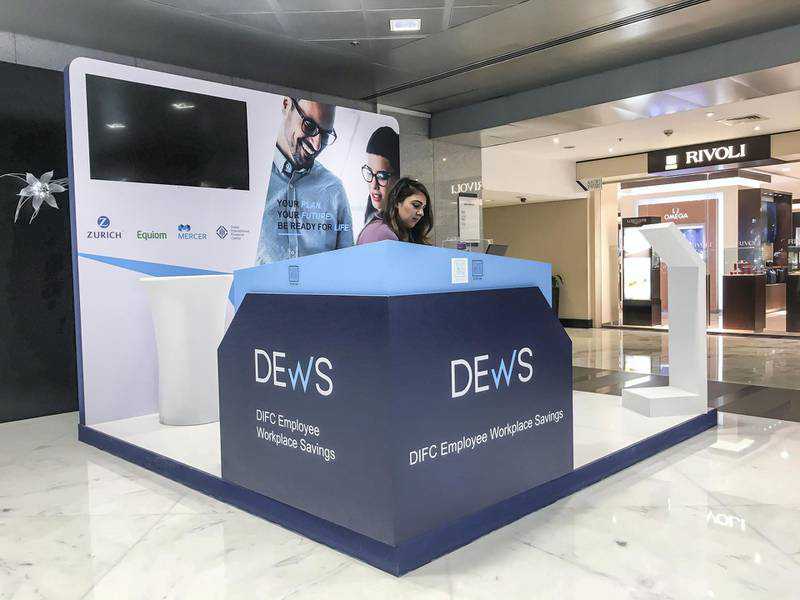DIFC's savings plan is a role model for other free zones to adopt
19 November, 2021

It is only a matter of time before other free zones in the UAE replace the end-of-service benefits model and adopt a pension system that is similar to the Dubai International Finance Centre's Employee Workplace Savings (Dews) plan, financial experts at the Arab Pensions Conference 2021 said.
"There is need to improve the current [end-of-service] model and the DIFC Dews [scheme] is a great example of the first step in that direction," Ramzi Khleif, general manager of digital wealth management platform StashAway Mena, said during a panel session at the two-day event.
"I think it's just a matter of time – and probably sooner rather than later – that this will get rolled out to the other free zones … and then eventually, this will replace the current kind of mandate, especially at least from an expat perspective."
Streamed online from Bahrain, the theme of this year's Arab Pensions Conference is “What should Mena pension systems look like for the next 50 years?”
DIFC was the first body in the UAE to overhaul the gratuity system – a defined, end-of-service benefit that all expatriate employees are entitled to after completing at least one year of service – when it introduced the Dews plan in February 2020.
Employers in the free zone are required to contribute an amount equal to 5.83 per cent or 8.33 per cent of an employee’s wage, depending on their length of service, on a monthly basis to a fund administered by a trust. Employees can also choose to make additional voluntary contributions to the Dews plan.
Equiom is the master trustee of the Dews programme, Zurich Workplace Solutions the plan administrator and global consultancy Mercer the investment adviser, while Smart FinTech Middle East provides the technology platform for the system.
The pension reform will be driven by FinTech and other technologies such as open Application Programming Interface (API), an underlying platform that allows different systems to connect with each other, Tim Phillips, managing director of Smart FinTech Middle East, told the panel.
"We built our platform around the concepts of open APIs, which means that we can do things like integrate directly with payroll systems," Mr Phillips said.
"So if you want to launch a widespread pension scheme with lots and lots of companies … as they run their payroll, then they're able to integrate directly with the platform that runs their pension. Any business owners who have signed up to the Dews scheme at the DIFC will have experienced a process that takes just a couple of minutes to do."
However, the end-of-service benefit model can be risky as companies may not have the cash reserves to afford to pay employees who have resigned, or may even become insolvent, the panellists said.
This sentiment was reflected in a report released by Willis Towers Watson in June this year, which found that 78 per cent of companies in the Middle East do not fund end-of-service gratuity at all. Instead, they pay it out of company cash when the benefits fall due.
“The minority of companies that are funding it are just doing so by putting money aside into a cash account,” Ashika Tailor, director of global services solutions at Willis Towers Watson, said at the time.
“If the employer becomes insolvent, benefits are at risk, with no back-up funds to pay even partial benefits. Strict employer liability should be measured and disclosed in line with international accounting standards for employee benefits.”
Meanwhile, legislation is needed to change the current gratuity model for foreign workers, said panellist Wim Daems, a founding partner at Belgium-based Prime Factor, a consulting and software company that connects IT, actuarial, pensions and insurance services.
"There is definitely already legislation ongoing on some government pensions," he said. "On the individual side, what has happened with Dews is a perfect example of that legislation … which replaces the end-of-service benefit with a saving scheme.
"And I expect this to happen also with other free zones [in the UAE] in the next couple of years in the entire GCC in the next couple of decades."
Earlier this year, AXA Green Crescent Insurance Company also introduced a workplace savings plan to help UAE employees save for their retirement and improve their financial well-being.
The Employee Secure Saver plan helps employers provide employees with a savings vehicle similar to those available globally, the insurer said in April.
Source: www.thenationalnews.com
